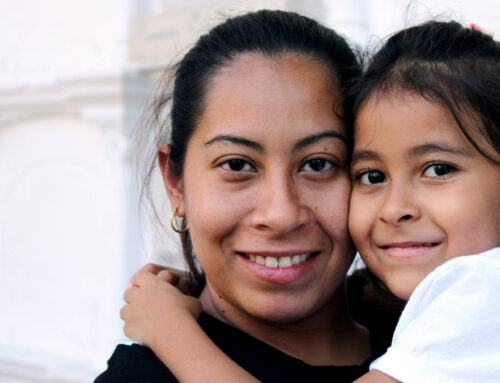
Mental Health CHW-led Programs Show Promise in Latino Communities
February 2019
For the approximately 58 million Latinos1 living in the United States, finding access to mental health care that they can identify with poses significant challenges. Only 5% of physicians identify as Latino2 and further, only 1% of all U.S. psychologist practitioners identify themselves as Latino.7 This void has had an impact on the way mental health is addressed in Latino communities. This is significant, as common mental health issues like anxiety, major depression, and posttraumatic stress disorder may go untreated due to lack of information, cultural differences and language barriers.3 In fact, only 1 in 10 Latinos with a mental disorder use mental health services from a general health care provider.3 And for the mental health workforce, lack of racial diversity, language barriers, and increasing costs serve as major factors in providing access to adequate care.
Community Health Workers (CHWs), known for serving as a trust-worthy liaison between medical professionals and their community, have been proven to improve access to and quality of care in underserved communities4. They are a popular alternative answer to the lack of culturally competent mental health physicians. CHWs can translate educational materials, provide in-depth knowledge of social norms, and help navigate patients through the health care system gaining the trust of community members in the process. Interest in the use of culturally-embedded, community-oriented CHWs to address mental health is growing. This is good news for millions of Latinos across the US.
CHWs Address Cultural Needs that Effectively Increase Access to Quality Care
The lack of access to information and services in Spanish can prevent many Latinos from seeking care. Many CHW-led interventions recruit bi-lingual members of the community, allowing for correct interpretation of information, effective education and a way to address stigma. More importantly, it allows individuals who face language barriers the path to express their mental health concerns without fear of misinterpretation.5
Furthermore, stigma can be hard to address for mental health care professionals who aren’t from within the Latino community. For instance, an examination of older Latinos found that they reported a greater embarrassment concerning mental health illness than their African American and European American peers.6 CHWs are typically from the community they serve, oftentimes they are former co-workers, neighbors, or local leaders. They are safe to confide in and act as a bridge between patients and providers.
Of Latinos who do seek help from a mental health care provider, 50% don’t return for a follow-up.7 There are several factors that impact this disparity. Dr. Elizabeth Fraga, a Latino-focused practitioner and full-time lecturer at Columbia University’s Teachers College says, “Some Hispanics are not comfortable speaking completely in English and sometimes the values of psychotherapy, or the therapist, are antithetical to those of a Hispanic client.”15 CHW home visits can be an effective way to off-set missed visits and they have proven to be successful in other health care domains.
For example, the National Center for Biotechnology Information conducted a study on the effects of home visits by trained CHWs on care seeking from a health facility. The study compared two interventions on groups of mothers, one being led by a CHW and the other, not. It found that those in the CHW-led intervention had a significantly higher rate of seeking out care from the appropriate health care provider.9 Furthermore, Minnesota, New York, Utah, and Washington State provide pathways to finance CHW home-based services through Medicaid because of its cost-effectiveness and proven positive outcomes.10
Home visiting services targeting asthma are estimated to generate $1.39 to $5 of savings for every dollar invested. 10

MHP Salud CHWs prepared to take action!
CHW Programs that Focus on Mental Health
MHP Salud created Salud Para Todos (Health for All), a program that provides community education sessions on mental health topics such as stress, domestic violence, substance abuse and the relationship between chronic disease and mental health. Salud Para Todos helps improve communities by addressing the stigma around mental health and encouraging the community to be accepting of those facing emotional challenges.11
The classes address major entry-point barriers for Latinos. In 2015, Salud Para Todos was delivered to residents of rural colonias in Hidalgo County, Texas. It reached 2,076 people, out of which, 276 participated in group education classes. Knowledge amongst those participants around mental health improved. At the baseline, participants scored an average of 42% on a brief knowledge survey compared to an average score of 96% after completion of the course. The knowledge gained can be used to combat the stigma Latinos have around mental health.
There is further evidence of the success of mental health programs that utilize CHWs. The Journal of Health Care for the Poor and Underserved conducted a study of 9 CHW-led mental health interventions which served a total of 1,330 individuals, half of which were recent migrants and did not speak English. They found that 8 of the 9 were effective at addressing participants’ mental health needs.12 Again, suggesting that CHWs can impact entry point barriers to mental health in communities that suffer from less access to resources.
Future of CHW Programs in Mental Health
The future of CHW-led mental health programs looks promising. Overall the CHW workforce is expected to grow 16% by 202614. With the Latino population expected to grow to 24.6% by 204513, mental health issue will rise and more mental health workers who are culturally equipped to provide services will be needed. In the meantime, programs like Salud Para Todos are creating easier pathways and support to implement Community Health Worker led programs across the nation.
Visit MHP Salud’s FREE Resource page to download the Salud Para Todos Implementation Guide and program manual (Available in English and Spanish).
About MHP Salud
MHP Salud has over thirty years of experience implementing CHW programs and training organizations looking to start and/or strengthen their own CHW programs. For more information about MHP Salud, our services, and how we can help you, please email us at info@mhpsalud.org
Sources
- https://www.census.gov/newsroom/facts-for-features/2018/hispanic-heritage-month.html
- https://www.ncbi.nlm.nih.gov/pmc/articles/PMC3105899/
- American Psychiatric Association, Mental health Disparities: Hispanics and Latinos www.psychiatry.org
- American Public Health Association. Support for community health workers to increase health access and to reduce health inequities (APHA Policy No 20091). Washington, DC: American Public Health Association, 2009 Nov 10. https://www.apha.org/policies-and-advocacy/public-health-policy-statements/policy-database/2014/07/09/14/19/support-for-community-health-workers-to-increase-health-access-and-to-reduce-health-inequities
- National Alliance of Mental Health https://www.nami.org/find-support/diverse-communities/latino-mental-health
- https://www.ncbi.nlm.nih.gov/pmc/articles/PMC5834514/
- https://www.apa.org/monitor/jan05/closingthegap.aspx
- https://nashp.org/wp-content/uploads/2017/11/CHW-Home-Improvement1.pdf
- https://www.ncbi.nlm.nih.gov/pmc/articles/PMC4848742/
- https://nashp.org/wp-content/uploads/2017/11/CHW-Home-Improvement1.pdf
- https://2ow7t71bjuyu4dst8o28010f-wpengine.netdna-ssl.com/wp-content/uploads/edd/2015/10/Salud-Para-Todos-Manual-English.pdf
- Journal of Health Care for the Poor and Underserved. Volume 29, Number 1, Johns Hopkins University Press. February 2018; http://muse.jhu.edu/article/686958
- https://www.brookings.edu/blog/the-avenue/2018/03/14/the-us-will-become-minority-white-in-2045-census-projects/
- https://www.bls.gov/ooh/community-and-social-service/health-educators.htm
- Fraga, E. D., Atkinson, D. R., & Wampold, B. E. (2004). Ethnic Group Preferences for Multicultural Counseling Competencies. Cultural Diversity and Ethnic Minority Psychology, 10(1), 53-65. http://dx.doi.org/10.1037/1099-9809.10.1.53






